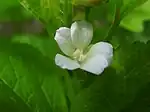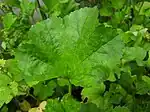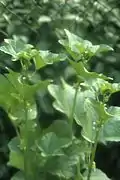Malva verticillata
Malva verticillata, also known as the Chinese mallow[1] or cluster mallow,[2] is a species of the mallow genus Malva in the family of Malvaceae found in East Asia from Pakistan to China. M. verticillata is an annual or biennial that grow up to 1.7 meters in high and can inhabit woodland areas of different soil types. The small, symmetrical flowers have five white, pink or red petals (0.8 cm) and thirteen or more stamens. Each flower has three narrow epicalyx bracts. The fruit is a dry, hairless nutlet. The leaves are simple and alternate.[3]
| Malva verticillata | |
|---|---|
.jpg.webp) | |
| Illustration of the leaves and seeds of M. verticillata | |
| Scientific classification | |
| Kingdom: | Plantae |
| Clade: | Tracheophytes |
| Clade: | Angiosperms |
| Clade: | Eudicots |
| Clade: | Rosids |
| Order: | Malvales |
| Family: | Malvaceae |
| Genus: | Malva |
| Species: | M. verticillata |
| Binomial name | |
| Malva verticillata | |
In temperate climates, it flowers from July to September and the seeds from August to October. The flowers of the plant are self-fertile but can also be pollinated by insects.[4]
Distribution
The species originates in Asia. It is widely distributed in Europe and is considered an invasive plant.[5] It is also present in North America, including most states in the USA.[3]
Uses
The plant was an important leaf vegetable in pre-Han China and widely cultivated.[6] Mallow is mentioned in Huangdi Neijing as one of the five consumable herbs (五菜) which included mallow (葵), pea leaves (藿), Allium macrostemon (薤), Welsh onion (蔥) and Garlic chives (韭).[7] It is mentioned in the Zuo Zhuan in Duke Cheng's reign by Confucius to compare to the head of the Bao clan saying he is not as smart as a kuicai (mallow) because it keeps its roots to the ground. It was deemed to be a major vegetable until the Northern Wei, supposedly. The technology for domesticating mallow was well recorded in Qimin Yaoshu. The acreages dwindled since the Tang dynasty. In his Nong Shu [Agricultural Manual], Wang Zhen wrote that mallow came top among various vegetables, because "it could be alternative in years of crop failure, or be marinated to serve with staples". There were rare occasions that people cultivated or consumed mallow during the Ming dynasty.[8]
It is also grown as an ornamental plant.[3]
 M. verticillata flower
M. verticillata flower M. verticillata leaves
M. verticillata leaves M. verticillata aerial portions
M. verticillata aerial portions
References
- BSBI List 2007 (xls). Botanical Society of Britain and Ireland. Archived from the original (xls) on 26 June 2015. Retrieved 17 October 2014.
- USDA, NRCS (n.d.). "Malva verticillata". The PLANTS Database (plants.usda.gov). Greensboro, North Carolina: National Plant Data Team. Retrieved 27 January 2016.
- "Malva verticillata L. whorled mallow". Go Botany New England. Native Plant Trust. Retrieved 14 January 2020.
- Malva verticillata - L., Plants for a Future
- "Malva verticillata". Invasive species compendium. CABI. Retrieved 14 January 2020.
- Anderson, Eugene N. (1988), The Food of China, Yale University Press
- 古代五菜, 4 March 2010
- Wu, Cunhao (1996). 中国农业史 [A History of Chinese Agriculture]. p. 410. ISBN 9787810276962.
External links
 Media related to Malva verticillata at Wikimedia Commons
Media related to Malva verticillata at Wikimedia Commons- "Malva verticillata". Plants for a Future.
- Malva verticillata in the CalPhotos photo database, University of California, Berkeley